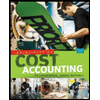
Concept explainers
Income statement with variances
Prepare an income statement through gross profit for Bellingham Company for the month ended March 31 using the variance data in Practice Exercises 23-1A through 23-4A. Assume that Bellingham sold 15,000 units at $172 per unit.
Income statement with variances:
The financial statement which reports revenues and expenses from business operations and the result of those operations as net income or net loss for a particular time period is referred to as income statement. In the income statement with variances, the balance of each variances account indicates the favorable and unfavorable variance at the end of the period.
Gross Profit:
Gross Profit is the difference between the net sales, and the cost of goods sold. Gross profit usually appears on the income statement of the company.
To prepare: An income statement through gross profit for the month ended March 31.
Explanation of Solution
The income statement through gross profit for the month ended March 31 for Company B is as follows:
|
Company B Income statement through gross profit For the month ended March 31 | |||
|
Sales
| 2,580,000 | ||
| Less: Cost of goods sold- at standards (1) | 1,463,625 | ||
| Gross profit- at standards | 1,116,375 | ||
| Unfavorable $ (a) |
Favorable $ (b) | ||
| Less: Variances adjustments to gross profit at standards | |||
| Direct materials price (5) | 9,000 | ||
| Direct materials quantity (6) | (5,625) | ||
| Direct labor rate (8) | (9,270) | ||
| Direct labor time (9) | 36,000 | ||
| Factory overhead controllable (11) | (1,230) | ||
| Factory overhead volume (12) | (2,300) | ||
| Net variances from standard cost – unfavorable (a) – (b) | 26,575 | ||
| Gross-profit | 1,089,800 | ||
Table (1)
Working notes:
To determine the cost of goods sold-at standards:
(1)
Determine the direct materials:
(2)
Determine the direct labor:
(3)
Determine the direct labor:
(4)
The direct materials price variance is determined as follows:
(5)
The direct materials quantity variance is determined as follows:
(6)
Determine the standard direct labor hours:
(7)
The direct labor rate variance is determined as follows:
(8)
The direct labor time variance is determined as follows:
(9)
Determine the standard direct labor hours:
(10)
Determine the variable factory overhead controllable variance.
(11)
The fixed factory overhead volume variance is determined as follows:
(12)
Standard hours for actual units produced are determined as follows:
(13)
Therefore the gross profit for Company B is $1,089,800.
Want to see more full solutions like this?
Chapter 23 Solutions
Working Papers, Chapters 1-17 for Warren/Reeve/Duchac’s Accounting, 27th and Financial Accounting, 15th
- I need assistance with this financial accounting question using appropriate principles.arrow_forwardI need help with this general accounting question using the proper accounting approach.arrow_forwardI am looking for the correct answer to this general accounting question with appropriate explanations.arrow_forward
- Please provide the correct answer to this general accounting problem using accurate calculations.arrow_forwardPlease provide the accurate answer to this general accounting problem using valid techniques.arrow_forwardPlease provide the solution to this financial accounting question using proper accounting principles.arrow_forward
- I need help finding the accurate solution to this financial accounting problem with valid methods.arrow_forwardPlease provide the correct answer to this general accounting problem using valid calculations.arrow_forwardI am looking for help with this general accounting question using proper accounting standards.arrow_forward
 Managerial AccountingAccountingISBN:9781337912020Author:Carl Warren, Ph.d. Cma William B. TaylerPublisher:South-Western College Pub
Managerial AccountingAccountingISBN:9781337912020Author:Carl Warren, Ph.d. Cma William B. TaylerPublisher:South-Western College Pub Financial And Managerial AccountingAccountingISBN:9781337902663Author:WARREN, Carl S.Publisher:Cengage Learning,Principles of Accounting Volume 2AccountingISBN:9781947172609Author:OpenStaxPublisher:OpenStax College
Financial And Managerial AccountingAccountingISBN:9781337902663Author:WARREN, Carl S.Publisher:Cengage Learning,Principles of Accounting Volume 2AccountingISBN:9781947172609Author:OpenStaxPublisher:OpenStax College Principles of Cost AccountingAccountingISBN:9781305087408Author:Edward J. Vanderbeck, Maria R. MitchellPublisher:Cengage Learning
Principles of Cost AccountingAccountingISBN:9781305087408Author:Edward J. Vanderbeck, Maria R. MitchellPublisher:Cengage Learning



